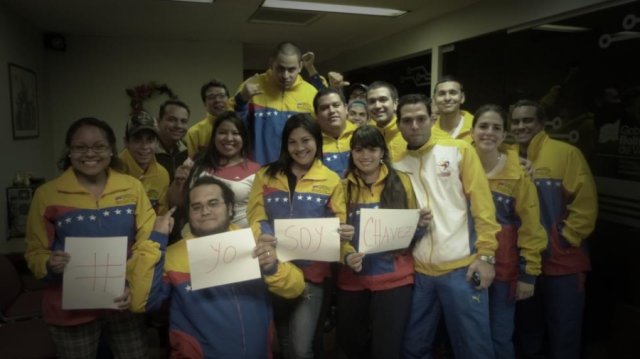
The Venezuelan government has responded to opposition and private media accusations that it is being “mysterious” regarding information on Chavez’s health situation, and has called such statements as well as rumours being spread on social networks “psychological warfare”.
“The government of the Bolivarian Republic of Venezuela warns the Venezuelan public of a campaign of psychological warfare unleashed by the international media regarding the health of the head of state," said Ernesto Villegas, minister for communication on January 3 as he read out the government statement in a national broadcast.
"This campaign aims ultimately to destabilise the Bolivarian Republic of Venezuela, ignore the popular will expressed in the presidential elections last October 7, and end the Bolivarian Revolution led by Chavez.”
International solidarity: Photos of people around the world with "Yo Soy Chavez" (I am Chavez) signs.
Vice-president Nicolas Maduro also asked the people of Venezuela to “trust the national authorities, who are more united than ever”. He said that since Chavez’s operation for reoccurring cancer in Cuba on December 11, the government has released 26 official statements informing the public about the state of Chavez’s health and “always tells the truth”.
Maduro specifically accused Ramon Aveledo, executive secretary of the opposition umbrella group, the Roundtable for Democratic Unity (MUD), of being behind the rumour campaigns that have been started through social networking sites such as Twitter and Facebook.
"It is essential that the government act in a manner that gives confidence," Aveledo told a news conference. "The official version hides more information than it gives.”
International media
Several international mass media outlets, including The Australian and the BBC have used Aveledo’s press conference to publish headlines casting doubt on the Venezuelan government, such as, “Venezuelan opposition demands ‘truth’ on Chavez health”, and the Washington Post headlined with “Venezuelans demand answers on Chavez’s health”.
The Australian, using an AAP article, and The LA times quoted Aveledo to say that the “Venezuelan constitution calls for new elections within 30 days if the president-elect is unable to take the oath of office”.
However, the 30 day period for new elections only applies if the president is made permanently unavailable, which the constitution defines as death, or permanent incapacitating illness.
Reflecting the statements being made by the Venezuelan opposition, US State Department spokeswoman Victoria Nuland said on Janauary 2: “We don’t have any way to evaluate what’s being said, but we have seen concern within Venezuela that the government’s not being transparent.”
Further, opposition leader and mayor of Caracas Metropolitan District, Antonio Ledezma, said on January 3 that he was proposing that a commission be sent to Cuba to “verify president Hugo Chavez’s state of health” and said that such a commission should be made up of himself and two other opposition leaders, Henrique Capriles and Henri Falcon, as well as “professionally reliable and morally recognised doctors”.
“I’m not asking permission to go to Cuba, I think we have the right to go there and see what is happening, we should go and that’s it," he said. "Enough of the mystery, Venezuela isn’t a Cuban colony.”
He also repeated his own suggestions made a few months ago that Chavez should renounce his position. “The president should separate himself from his position and dedicated himself to recovering from the illness that he has had for over 18 months,” he said.
An unknown person also created a twitter account which falsely claimed to be run by Chavez’s daughter, Rosa Virgina Chavez, who is with her father in Cuba. The account gave false information about Chavez’s state of health
Speculation and misrepresentations
Spain’s ABC reported on December 31 that president Chavez “has entered into an induced coma, with his vital signs very low, maintained by artificial assistance... sources consulted by the ABC assured on Monday that a disconnection from artificial assistance had been scheduled...this disconnection, with the foreseeable result of death, could happen at any time”.
The article further claimed that “almost half a metre of his intestine has been extracted” and that Chavez hasn’t eaten solid food since.
The ABC also speculated that Venezuelan government officials “seem to be preparing the country for the news of his [Chavez’s] death”.
The report was reposted and copied by other mainstream media sources, and follows an earlier report by the ABC, in late December, claiming that “Chavez had a tracheotomy” and was on “artificial respiration”.
Maduro referred to the reports put out by Spain’s ABC as “Francoist”.
The government's January 3 statement assured: “Following delicate surgery on December 11, Comandante Chavez has faced complications as a result of a severe respiratory infection. This infection has led to respiratory deficiency that requires Chavez to remain in strict compliance with his medical treatment.”
“The government of the Bolivarian Republic of Venezuela reiterates its confidence in the medical team that is attending to the president and that has permanently monitored his clinical evolution and acted with the most absolute rigorousness in the face of each one of the difficulties presented.”
[Reprinted from Venezuela Analaysis.]
